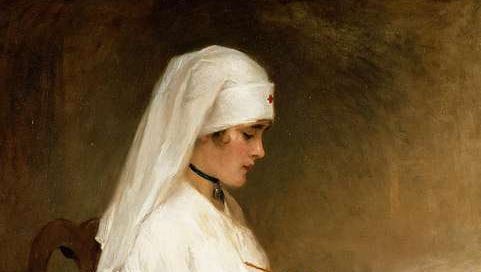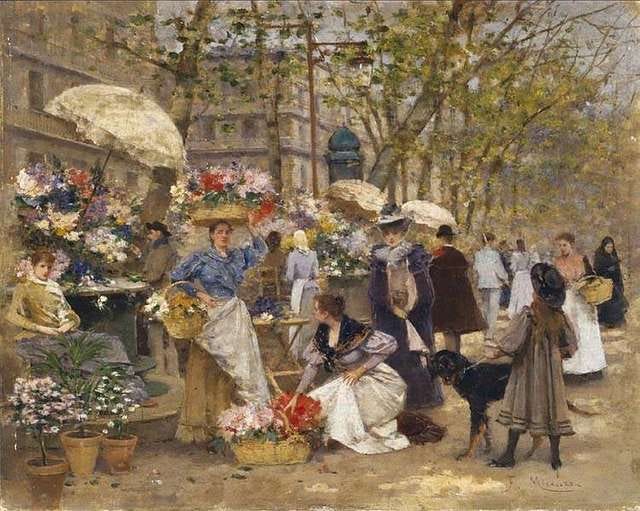Florence Nightingale and Mrs Dalloway
This week we mark International Nurses Day with an excerpt from a speech by Ur-nurse Florence Nightingale. We also celebrate the 100th birthday of Virginia Woolf's influential novel.
from Florence Nightingale to her Nurses
A SELECTION FROM MISS NIGHTINGALE’S ADDRESSES TO PROBATIONERS AND NURSES OF THE NIGHTINGALE SCHOOL AT ST. THOMAS’S HOSPITAL, LONDON
1872
For us who Nurse, our Nursing is a thing, which, unless in it we are making progress every year, every month, every week, take my word for it we are going back.
The more experience we gain, the more progress we can make. The progress you make in your year’s training with us is as nothing to what you must make every year after your year’s training is over.
A woman who thinks in herself: “Now I am a ‘full’ Nurse, a ‘skilled’ Nurse, I have learnt all that there is to be learnt”: take my word for it, she does not know what a Nurse is, and she never will know; she is gone back already.
Conceit and Nursing cannot exist in the same person, any more than new patches on an old garment.
Every year of her service a good Nurse will say: “I learn something every day.”
I have had more experience in all countries and in different ways of Hospitals than almost any one ever had before (there were no opportunities for learning in my youth such as you have had); but if I could recover strength so much as to walk about, I would begin all over again. I would come for a year’s training to St. Thomas’ Hospital under your admirable Matron (and I venture to add that she would find me the closest in obedience to all our rules), sure that I should learn every day, learn all the more for my past experience.
And then I would try to be learning every day to the last hour of my life. “And when his legs were cuttit off, He fought upon his stumps,” says the ballad; so, when I could no longer learn by nursing others, I would learn by being nursed, by seeing Nurses practise upon me. It is all experience.
Agnes Jones, who died as Matron of the Liverpool Workhouse Infirmary (whom you may have heard of as “Una”), wrote from the Workhouse in the last year of her life: “I mean to stay at this post forty years, God willing; but I must come back to St. Thomas’ as soon as I have a holiday; I shall learn so much more” (she had been a year at St. Thomas’) “now that I have more experience.”
When I was a child, I remember reading that Sir Isaac Newton, who was, as you know, perhaps the greatest discoverer among the Stars and the Earth’s wonders who ever lived, said in his last hours: “I seem to myself like a child who has been playing with a few pebbles on the sea-shore, leaving unsearched all the wonders of the great Ocean beyond.”
By the side of this put a Nurse leaving her Training School and reckoning up what she has learnt, ending with—“The only wonder is that one head can contain it all.” (What a small head it must be then!)
I seem to have remembered all through life Sir Isaac Newton’s words.
And to nurse—that is, under Doctor’s orders, to cure or to prevent sickness and maiming, Surgical and Medical,—is a field, a road, of which one may safely say: There is no end-no end in what we may be learning every day.
What we love about this passage…
Nightingale addresses this new cohort of young women embarking on nursing careers in the 1870s with tremendous authority as one of the founders of the profession. She then makes a bold move: she shores up this authority by invoking distinguished male thinkers such as Sir Isaac Newton to lend dignity and legitimacy to this relatively young and female-dominated profession, while equally drawing upon testimony from experienced nurses such as Agnes Jones, mixing these disparate sources harmoniously together.
About the Author
Florence Nightingale (1820-1910) was born into a wealthy family and educated at home by her father who, unusually for the time, gave his daughters the same education as boys. Florence showed particular aptitude for statistics and what we would now call data visualization, a field in which she became a pioneer.
Her calling, however (literally, through a succession of religious epiphanies), was nursing. In 1850, she was introduced to methods for treating the sick at a Lutheran community in Germany where she then trained, and she applied these new techniques to her work in the Crimean War, treating wounded soldiers. These methods, which we now take for granted in every hospital setting, centred on scrupulous hygiene and disinfecting, which were novel ideas at the time. Her rigorous implementation of these ideas and approaches revolutionized medicine.
She established the nursing school at St Thomas’s Hospital in London in 1860, now part of Kings College London. There is now a Florence Nightingale Museum, honouring ‘the lady with the lamp.’
Nightingale’s voice dominates the history of nursing, and International Nurses Day is celebrated on her birthday. But there were other contributors who have received less attention, such as Mary Jane Seacole, a Black nurse who likewise served in the Crimean War and helped to shape the profession of nursing. You can read her account of her experiences here.
You can also read about other ‘hidden figures of nursing’ here.
And…Happy 100th Birthday, Mrs Dalloway!
What does Mrs Dalloway have in common with Florence Nightingale? A lot, actually. They share London and nursing as key preoccupations. In Woolf’s novel, a soldier suffers from PTSD sustained from fighting at the front in World War I, but his trauma is so severe that he seems beyond the reach of medical attention. Woolf in some ways picks up where Florence Nightingale’s work had left off, going beyond the treatment of the physical body to include states of mind and mental health.
Here is the opening of the novel, featuring a woman setting out to buy flowers in London.
Mrs. Dalloway said she would buy the flowers herself.
For Lucy had her work cut out for her. The doors would be taken off their hinges; Rumpelmayer’s men were coming. And then, thought Clarissa Dalloway, what a morning—fresh as if issued to children on a beach.
What a lark! What a plunge! For so it had always seemed to her, when, with a little squeak of the hinges, which she could hear now, she had burst open the French windows and plunged at Bourton into the open air. How fresh, how calm, stiller than this of course, the air was in the early morning; like the flap of a wave; the kiss of a wave; chill and sharp and yet (for a girl of eighteen as she then was) solemn, feeling as she did, standing there at the open window, that something awful was about to happen; looking at the flowers, at the trees with the smoke winding off them and the rooks rising, falling…
Virginia Woolf (1882-1941) is one of the best-known modernist authors for novels such as Mrs Dalloway (1925), To the Lighthouse (1927), and Orlando (1928), as well as many volumes of essays, short stories, and even a biography of the influential artist and critic Roger Fry, who painted the portrait of her above.
Her father, Leslie Stephen, encouraged her to read from his extensive library. Her literary appetite shocked him, causing him to eventually tell her: ‘Gracious child, how you gobble!’ She studied classics and history at the Ladies' Department of King's College London from 1897 to 1901.
You can read the full text of Mrs Dalloway here.
You might also enjoy Michael Cunningham’s 1998 novel The Hours, inspired by Mrs Dalloway.
Suggest a LitHit!
Tell us your own favourites from literature you've read, and we can feature you as a Guest Curator. Just email us with the following information:
Your full name
The title of the book you're suggesting
The location of the excerpt within the book (e.g., "in the middle of chapter 5"), or the excerpt itself copied into the email or attached to it (in Word)
Why you love it, in just a few sentences
About LitHits
LitHits helps you make time for reading by bringing you unabridged excerpts from brilliant literature that you can read on the go, anytime or any place. Our curators carefully select and frame each excerpt so that you can dive right in. We are more than a book recommendation site: we connect you with a powerful, enduring piece of literature, served directly to your mobile phone, tablet or computer.
You might also enjoy...
Feedback
We'd love to hear your thoughts on our newsletter:
kshepherdb@yahoo.co.uk
Graphic design by Sara Azmy
All curation content © 2025 LitHits. All rights reserved.





